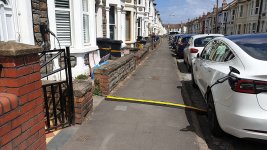So much anti-progression in this thread and across public sentiment as a whole. Whether you could term it fact or not I wouldn't go that far, but I do think EVs are the future; whether that's for cost, green or legislation factors (or a mix of these and others). It's definitely fact that for those that can, charging at home is far cheaper for both the owner and the local authority than investing in public EV infrastructure, and the public subsequently paying the cost for that via kWh or tax.
And that includes those without a drive, who, as I've said before, make up the vast, VAST majority of areas where EVs are needed most to tackle inner-city pollution. I haven't been able to find any hard figures on that, but from my knowledge of Bristol as an example, I would guess that at least 95% of households that live within Bristol's planned Clean Air Zone don't have a driveway or dedicated parking space. Conversely where pollution isn't an issue - suburbs and countryside - dedicated parking is plentiful.
So there just has to be a solution, which I believe is simply the way I'm currently working it. Home charger at home for occasional use and emergencies, a large portion of destination charging, and public charging en-route and as backup for those times when home/destination isn't possible. Public chargers are fine, but they cost a factor more than home and destination charging that they're not ideal regularly, and it just takes so much more investment to meet capacity.
Imagine if when ICEs were invented every home already had a fuel line installed? That's the position we're in with EVs.
No I can't park outside my house 100% of the time, but I can at least 80% of the time. My neighbours are all on-board, and when I first got it would message me almost every couple of days to ask if I needed to swap cars with them to charge (until I said no every time because I didn't need to charge that regularly). But if I asked they'd happily swap, and that mentality will be even more commonplace when EVs are mainstream. I already live in a Resident's Parking Zone, which is free for EVs, and it would take no work to switch it to "only EVs, one per household" once they become the majority, to ease home-charging.
Where there's a will there's a way. Unfortunately some people are like a stable boy when the Ford Model T came out. Nasher is the only person on this forum who has come close to being ignored but I feel it a duty to counter the absolute nonsense he spurts out in any thread related to EVs.




 )
) 
